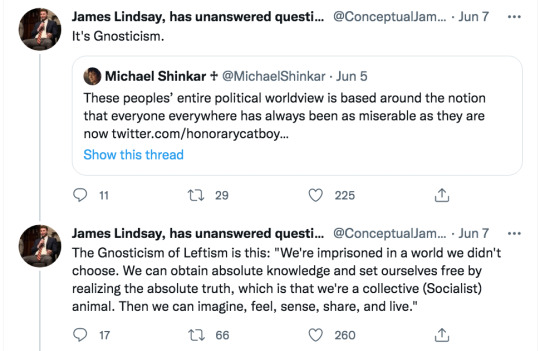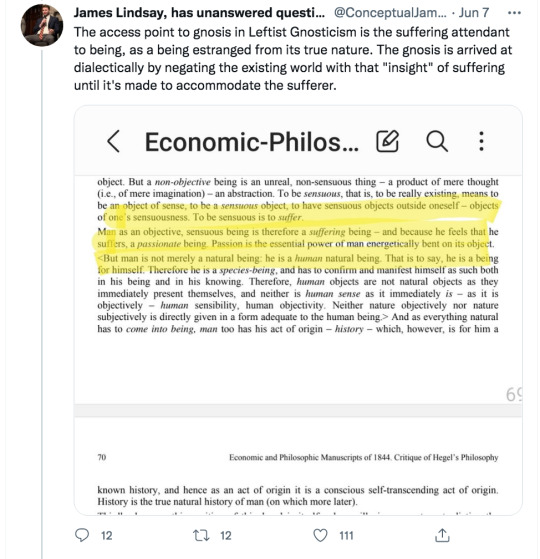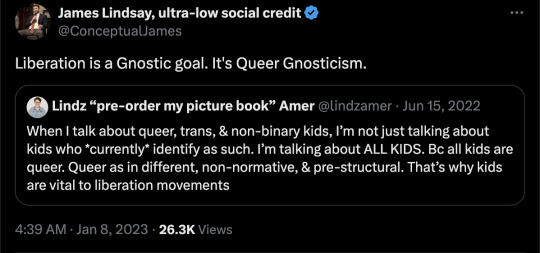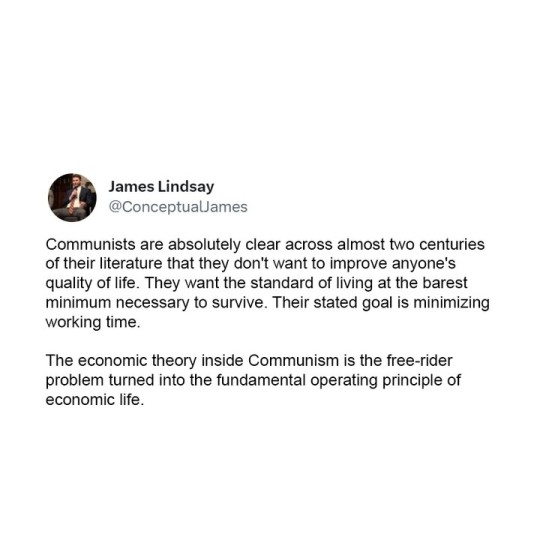#James Lindsay
Text

youtube
309 notes
·
View notes
Text
By: Helen Pluckrose and James Lindasy
Published: Apr 7, 2018
There is a troubling misunderstanding of the principle of freedom of speech gaining momentum right now. It fundamentally misunderstands two central concepts of the principle — individual freedom and the “marketplace of ideas.”
Before these can be discussed, it will be necessary to explain what we mean by “freedom of speech” or more precisely, what we do not mean.
We are not talking about the legal aspect of freedom of speech such as specific laws or constitutions of specific countries around the principle of freedom of speech, e.g., the US First Amendment. These legal structures relate to the principle of freedom of speech, but they are not the principle of freedom of speech. That principle is much, much broader and extends much further than how governments may or may not interfere with public speech.
We are also not talking about some non-existent right to make any words at all with one’s mouth or keyboard. The “speech” defended under “freedom of speech” does not refer to literal verbal utterances. Some of these are rightly illegal — commissioning a crime, perjury, fraud, false accusations, breaking confidentiality laws, and espionage, for examples. Defenders of freedom of speech are not attempting to change this.
We are talking about a principled defense of the free exchange of ideas on many levels of society; an acknowledgement that this is a basic human freedom and an understanding that viewpoint diversity and the whole process of arguing, questioning, challenging, doubting, refuting, and revising ideas is essential to the advancement of knowledge, to social progress, and to liberal democracy itself. In short, we are talking about what Jonathan Rauch describes as “liberal science,” the development of which in Western modernity has a long and multi-faceted intellectual history. It includes key liberal philosophers such as John Stuart Mill but also thinkers and political activists as diverse as Puritans and secularists, Marxists and Libertarians. Though rarely seen this way, it is, in fact, an advanced social technology. Establishing the “marketplace of ideas” as the most positive model for a successful and progressive society took hundreds of years and much hard work.
The principle of freedom of speech is often misunderstood. Lately, seemingly following the democratization of information and communication via the Internet and social media, the misunderstanding of the key tenets of the principle of freedom of speech most often takes the form of an accusation, which we might call the Fallacy of Demanding to Be Heard. These accusations can be broadly paraphrased like this:
“You say you are an advocate of free speech, but then you don’t allow everyone to talk to you. You advocate for the ‘marketplace of ideas’ as a way to advance knowledge and say that it must be open to everyone, but you don’t allow everyone to engage with yours. Therefore, on the one hand, you are saying that shutting down speech is wrong but on the other you are shutting down speech. This is, at best, inconsistent, and at worst, downright hypocritical.”
This is very confused on two central concepts of the principle of freedom of speech and these work on an individual level and on a societal level.
On an individual level, the Fallacy of Demanding to Be Heard misunderstands the concept of freedom.
Within freedom of speech, there are four essential freedoms:
The freedom to speak — Individuals may express all ideas without hindrance or punishment.
The freedom to listen — Individuals may listen to all ideas without hindrance or punishment.
The freedom not to speak — Individuals must not to be required to express any ideas or speak to any person.
The freedom not to listen — Individuals must not to be forced to listen to any ideas or any person.
Given that, alarmingly, so many of the people who seem confused about freedom of speech in this way describe themselves as secularists and skeptics and have long fully understood and argued that freedom of religion includes freedom from religion, perhaps a direct comparison with the freedom of religion will be helpful here.
Under freedom of religion, people are free to believe any creed they want to, and they are also free not to believe that creed or any creed at all. People are free to practice their religion but not to compel others to practice it, observe its obligations, participate in its rituals and customs, or accept its dogmas, doctrines, or premises. Freedom of religion entails the freedom to worship and to believe in accordance with one’s community or conscience, and it also contains freedom from being compelled to worship or believe any particular thing at all. A secularist mentality understands this, and only those who reject liberal secular values — that is, fundamentalists — feel others should be compelled to believe or worship in any particular way.
In the same way that it is clear that a defense of freedom of religion does not equate to a commitment to allow everyone else to impose their religion on you, it should be clear that a defense of freedom of speech does not equate to a commitment to allow everybody else impose their speech on you. Nowhere within freedom lies the right to be heard. You have the freedom to speak, yet every other individual has the freedom to ignore your speech by whatever means are necessary, including by removing themselves from the vicinity of it. Being ignored does nothing to infringe upon your right to speak, to hear, not to speak, or not to hear. Your freedom of speech remains fully intact because nowhere in that is the freedom to impose your speech upon others. The right to decide what one listens to remains as inviolable as the right to decide what one believes.
This is the “freedom” bit of freedom of speech.
On a societal level, the Fallacy of Demanding to Be Heard misunderstands the marketplace of ideas
Some people concede that freedom from speech should be a right even for people who defend freedom of speech but add that they think it is clear that those who argue for the importance of viewpoint diversity to advance knowledge and then refuse to listen to (certain) other views are not putting their money where their mouth is. That is, they are behaving hypocritically because they fail to consistently hold a principled line on viewpoint diversity.
This would certainly be a just accusation of hypocrisy if an individual who argues for this then refuses ever to engage with any different ideas. This is not a just accusation, however, if they merely refuse to engage with every idea and every proponent of every idea. Far too often, the criticism “You refuse to listen to other ideas (or your critics)!” means “You refuse to listen to me.” That may be, and there could be a number of reasons someone who is committed to freedom of speech might not be listening to you.
First, your ideas could simply not be within their area of interest or knowledge. We all have to be selective in what we discuss. People have approached me (Helen) recently to discuss economics, drug laws, and adoption policies. I am not well-informed on any of these things, neither do they interest me to the extent that ideology and psychology do. I declined to discuss because my opinion would not be worth much.
Second, they could find your ideas foolish, tedious, or unsupported by evidence. We have recently declined to discuss whether women should be able to vote, metamodernism, metaethics, certain framings of the issues with firearms, and the claim that God exists. We have discussed all these in the past and find such discussions fruitless. You might think we are wrong to think so but again, we all have to be selective, and we retain the right to decide what is worthwhile to give attention to.
Third, you could be personally rude or dishonest in your style of conversation. We are simply not going to enter a conversation with someone who is gratuitously abusive, snarky, insincere, misrepresents our position, or deliberately misses our point. You could be giving off every signal of discussing in bad faith, particularly in wishing to prove yourself right more than to discuss the issue with someone you know disagrees with you. There is no point in pretending that what follows from such a situation is going to be a conversation. At best it is a winding debate, and at worst it’s just a frustrating monologue from the effective equivalent of a street preacher. Conversation requires give and take, and ideally, when there is disagreement, it requires both participants to be willing to change their minds about some or all of the issues. When this condition is not met, there is no onus placed upon us to participate or to listen because, again, we all retain the right to decide what is worthwhile to give our attention to,
Fourth, your ideas could be being presented much better by someone else. We have often been accused of refusing to engage with disagreement when, in fact, the person disagreeing with us is just doing so badly whilst other people are doing it well and presenting us with a much more challenging and therefore interesting and potentially productive conversation. It is quite possible to have highly intellectually & ideologically diverse discussions by choosing to talk to and listen to the most thoughtful, reasonable, knowledgeable and honest proponents of a variety of ideas and not to engage with the abusive, the incoherent, the ignorant and the dishonest.
This last point is particularly important to note. There is a terrible sense of entitlement to insisting that someone must listen, not only to counterviews but your counterviews. We are small social and political commentators and writers, and we already have to be selective with the views we engage. If the person you seek to disagree with is a prominent public intellectual, realize that they will be receiving vast amounts of critical feedback, some of it of a very high quality and much of it off-point and downright rude. If you want yours to be one of the ones they engage with, you’ll have to earn that. It’s nothing personal; everyone faces this same difficulty in being heard by busy and prominent figures.
This is the crucial element of the metaphor called “the marketplace of ideas,” which is being so badly misunderstood. The metaphor appeals to a marketplace. If you were to show up at a farmer’s market with your tomatoes, it doesn’t matter if they are the best tomatoes in the world; it is still your job to attract interest in purchasing them. You cannot force people to buy them. You cannot force prominent individuals to try your tomatoes and then promote them.If someone is allergic to tomatoes, doesn’t like them, or isn’t in the mood for them — or yours, or you — at the time, they have every right to pass your tomatoes by, and you have no standing upon which to demand that they change their mind.
Within the marketplace of ideas, the responsibility is on each vendor to present his ideas to the public by showing them as best they can and hoping people will want to “buy” them, that is, take them seriously and engage with them. No one is obligated to buy any product they believe is inferior or, in fact, any product they are not interested in — for any reason — in a real marketplace in a free society, and it is a blatant infringement of their rights to attempt to force them to buy something they do not want. Likewise, no one is obligated to listen to, engage, promote, or be interested in any ideas within the marketplace of ideas, and it is a blatant infringement of their rights to attempt to force them to do otherwise. Furthermore, people can refuse interest for any reason, which includes any bad behavior on the part of the vendor, regardless of the quality of the product.
This is how the marketplace of ideas works, and it works well. There is no point complaining that your stall has been shut down if people decline to buy from it. It remains open, but it is your responsibility to improve your product by making your argument strong, your evidence substantial, your point clear, your ideas engaging, and your sales pitch courteous. In this way, even if any individual is genuinely badly motivated to avoid your justifiable and insightful criticism, other people will still hear it and your ideas will ultimately win out over theirs in the marketplace.
Conclusion
The Fallacy of Demanding to Be Heard is often leveled in terms of freedom of speech accompanied by gleeful (and reckless) accusations of hypocrisy. Not only is this a misunderstanding of the freedom part of freedom of speech and the marketplace part of the marketplace of ideas, it is a form of entitlement which can even lead to harassment and bullying. It is an attempt to insist that someone who isn’t interested in you or your ideas is somehow failing to uphold critical liberal, intellectual, or academic virtues and then, often, using that against them. This can create a vicious spiral in which the entitled and insulting behavior of someone demanding to be heard will encourage the other person to ignore them even more leading to the former becoming yet more intrusive and defamatory. A better approach for advocates of freedom of speech is to speak when you have something to say, listen when there’s something you want to hear, stay silent when it’s better you don’t speak, and be selective about what ideas and individuals you listen to in a way that upholds your belief in the productivity of viewpoint diversity. Allow people who want to talk and listen to each other do so and you will uphold the principle of freedom of speech. Don’t think you can force anyone to talk or listen to you.
==
I sometimes get people who insist that I need to hear their argument for the existence of gods, or that I should debate them. No, I don't. I've heard dozens of arguments, but more importantly, none of these people understand how pointless an argument for a god is, as opposed to evidence, and act hard done by in the refusal.
#Helen Pluckrose#James Lindsay#freedom of speech#free speech#viewpoint diversity#marketplace of ideas#Fallacy of Demanding to Be Heard#entitlement#religion is a mental illness
28 notes
·
View notes
Text
youtube
You Might Already Be A Member | James Lindsay | EP 367
Dr. Jordan B. Peterson and Dr. James Lindsay break down how Marxism evolved from a singular ideology into a genus, spawning many oppressor/oppressed dogmas across modern culture such as equity, critical race theory, and queer theory. They trace these sub-Marxist doctrines back past fundamental narrative into the theological realm, and detail their utility in the acquisition of power. Dr. Peterson and Dr. Lindsay also discuss the Grievance Studies Affair, of which Dr. Lindsay was a co-author and which casts a spotlight on the Marxist capture of our academic and scientific institutions.
An author, mathematician, and political commentator, Dr. James Lindsay has written eight books spanning a range of subjects including education, postmodern theory, and critical race theory. Dr. Lindsay is the founder of New Discourses, an organization dedicated to shining the light of objective truth in subjective darkness. Dr. Lindsay is the co-author of “Cynical Theories: How Activist Scholarship Made Everything about Race, Gender, and Identity―and Why This Harms Everybody” and the author of “Race Marxism,” as well as, “The Marxification of Education.” Dr. Lindsay has been a featured guest on Fox News, Glenn Beck, Joe Rogan, and NPR, and he has spoken at the Oxford Union and the EU Parliament.
#jordan peterson#james lindsay#discussion#marxism#marxists#power#crt#critical race theory#dogma#gnosticism#religion#equity#dei#humanities#science#stem#education#universities#k-12#postmodernism#postmodernists#derrida#foucault#activism#activists#race#gender#identity#satan#lucifer
2 notes
·
View notes
Text
youtube
Ez az elmúlt 7 év legfontosabb videója
2 notes
·
View notes
Text


2 notes
·
View notes
Video
youtube
2 notes
·
View notes
Photo



(link)
3 notes
·
View notes
Text
By: Logan Lancing
Published: Feb 28, 2024
People who have escaped cults all tell a similar story. That story starts with a desire to belong, coupled with a desire for purpose. Strong familial and social bonds are generally preferable to shaky relationships, isolation, and the feeling of being an outcast. Likewise, feeling like one’s life lacks any meaning or purpose is a recipe for anxiety, depression, or even madness. If you talk to people who have escaped cults, they all tell you that they didn’t set out to join a cult—the cult set out to prey on them, offering to fill the voids that we must all grapple with, to varying degrees, throughout our lives. The cult offers inclusion, affirmation, and a secret cult knowledge of life’s purpose. All one must do is take the leap of faith.
Cults are incredibly effective for a variety of reasons, most of which is their ability to lead initiates deeper into the cult, even when those initiates start to sense that the “inclusion,” “affirmation,” and “purpose” offered to them comes with some very nasty conditions and ultimatums. Cult survivors describe how difficult it is to stop placing one foot in front of the other when the cult has total control of one’s physical, social, and emotional environments. Cults work tirelessly to control all information entering an initiate’s eyes and ears. Cults control the books you can read, the news you can watch, the organizations you can trust, the experts you must listen to, and the people you confide in. The cult environment is one of endless propaganda designed to be so effective that one loses control of their own thoughts; loses control over the voice in their head.
Once an initiate finds themselves in the cult’s totalizing environment (see Thought Reform and the Psychology of Totalism by Robert Jay Lifton) the cult lifts the veil of love, affirmation, and inclusion and reveals a cycle of psychological abuse designed to drag the initiate deeper into the cult’s doctrine. This abuse is justified through a language of purity—initiates must let go of all the bad influences and contamination of their former lives, revealing their deepest secrets through ritual confessions. The point is to strip the initiate down, leaving them totally vulnerable and exposed. Only then can the cult rebuild the initiate in the cult’s image.
Cult survivors will tell you that they often didn’t know they were in a cult until someone pierced the cult’s totalizing environment with a message from the outside; a tether to a long-lost reality; an invitation to step back into the real world. The Queering of the American Child is one such tether, and I hope parents nationwide will receive the message loud and clear: Education is in the grip of a religious cult—the Queer Cult.
Now, I don’t mean “queer” as in “gay” or “lesbian” or “bisexual.” I mean “queer” as it is defined in the academic literature of the Queer Cult’s doctrine: Queer Theory.
Unlike gay identity, which, though deliberately proclaimed in an act of affirmation, is nonetheless rooted in the positive fact of object-choice, queer identity need not be grounded in any positive truth or in any stable reality. As the very word implies, “queer” does not name some natural kind or refer to some determinate object; it acquires its meaning from its oppositional relation to the norm. Queer is by definition whatever is at odds with the normal, the legitimate, the dominant. There is nothing in particular to which it necessarily refers. It is an identity without an essence.[1] (Halperin, 1995, p. 62, italics in original)
Our children are “experiencing the queer,” as Queer Educational Activist Kevin Kumashiro explains in his 2009 book, Against Common Sense: Teaching and Learning Toward Social Justice (2nd edition). Specifically, our children are experiencing the “queer” because they have been purposefully placed in a state of psychological crisis. “Crisis,” Kumashiro says, “should be expected in the process of learning, by both the student and the teacher. Like queer activism, queer teaching always works through crisis…the goal is to continue teaching and learning through crisis—to continue experiencing the queer.”[2] (Kumashiro, 2009, p. 55)
The Queer Cult has total control of our national discourse as it relates to sex, “gender,” and sexuality. Our children are fed a steady diet of cult doctrine through mainstream media, social media, popular culture, the psychiatrists they consult, and the doctors their parents trust. Not least of which, our children attend schools that universally push the idea that children can be “born in the wrong body.” America’s children learn that they have “gender identities” that might not match their “sex assigned at birth.” A Medical Industrial Complex waits in the wings with irreversible puberty blockers, cross-sex hormones, and “gender affirming” surgeries.
The social and emotional pressures to conform to the Queer Cult’s corrupted understanding of reality are hard to bear. Most people know that “radical gender ideology” is insane, but they go along with it because they don’t want to be considered a “bad person,” “on the wrong side of history,” or worst of all, a “conservative.” The cult’s moral extortion racket is designed to drag us deeper into their agenda; deeper into what Queer Activist Michael Warner calls a “queer planet.”[3] However strong the pressure may be, we must remain tethered to reality—not only for ourselves, but especially for our children. As we say in the book,
[Queer Activists] believe they can arrest the steering wheel of History and drive us all off the ledge. Under normal circumstances, all of this nonsense would be cause for endless mockery and laughter. Unfortunately, Queer Activists have proved to be remarkably effective. Today, they already have one hand on the wheel, and our kids are in the car.[4]
In The Queering of the American Child you will learn what Queer Theory is, where it comes from, how it got into schools, and what it’s attempting to do with your children. You will learn that Queer Theory has nothing to do with helping gay kids, and nothing to do with helping troubled children feel “included” in a healthy set of societal norms. Letting the cultists speak for themselves, Dr. James Lindsay and I bring in hundreds of citations to lay bare the Queer Cult’s agenda. Our schools are initiating children into the Queer Cult through psychological manipulation and child abuse. What you read will shock you, and that’s a good thing. Welcome back to reality.

youtube
--
References
[1] Halperin, D. M. (1995). Saint Foucault: Towards a gay hagiography. Oxford University Press. (p. 61)
[2] Kumashiro, K. K. (2009). Against Common Sense: Teaching and Learning Toward Social Justice (2nd ed.). Routledge. (p. 55)
[3] Warner, M. (1991). Introduction: Fear of a queer planet. Social Text, (29), 3–17.
[4] Lancing, L. and Lindsay, J (2024) The Queering of the American Child: How A New School Religious Cult Poisons the Minds and Bodies of Normal Kids. New Discourses. (p. 65)
#Logan Lancing#James Lindsay#The Queering of the American Mind#queer theory#gender identity ideology#gender ideology#gender cult#queer gnosticism#liberation#queer liberation#cult survivor#religion is a mental illness#Youtube
10 notes
·
View notes
Text
We're Dealing With A Cult - James Lindsay
youtube
View On WordPress
#DQSH#Grooming#James Lindsay#Marxification of Gender#The Issue is Never the Issue#the Issue is the Revolultion#The Woke Activist Left#Youtube
1 note
·
View note
Text





How to Remain Inoculated with James Lindsay
1 note
·
View note
Text
RapSnacks Founder James Lindsay & Master P Talk 2024 Disrupt Summit
youtube
James Lindsay, the founder of RapSnacks and hip-hop mogul Master P talks about the 2024 Disrupt Summit in Fort Lauderdale, Florida last week. The summit is in its second year and the conference is a place for sharing and building marketing strategies for cultural consumers. In this interview, they share why they started the summit and some of the issues entrepreneurs face getting started with their own culturally conscious brands.
0 notes
Text
De leestips van Nonkel Fons (309)
Fons Mariën las Woke is het nieuwe Marrakech-pact van Tom Lanoye…
Continue reading Untitled

View On WordPress
#Anousha Nzume#Bart De Wever#Floris van den Berg#Gloria Wekker#Helen Pluckrose#James Lindsay#Paul Goossens#Ron DeSantis#Susan Neiman#Tom Lanoye
0 notes
Text
youtube
The Art of the Culture War: Revealing the Strategies of the Left with James Lindsay - The Vivek Show
In this eye-opening discussion, U.S. Presidential Candidate Vivek Ramaswamy and cultural critic James Lindsay delve into the tactics and strategies used by the left in the ongoing culture war. They discuss the challenges within the current political landscape, the rise of the ESG movement, and the strategic maneuvers used to demoralize and exhaust creative problem-solving. Together, they expose the hidden playbook of their opponents and emphasize the need to address the root causes of cultural and political issues. The conversation provides valuable insights into the long-term strategies employed by activist groups to infiltrate and subvert institutions.
#vivek ramaswamy#james lindsay#discussion#conversation#the vivek show#podcast#culture#culture war#wokeness#woke#base#corporations#government#esg#environmental social governance#progressives#agenda#playbook#maneuvers#politics#sustainability#identity#activists#infiltrate#subvert#Youtube
1 note
·
View note
Text

2K notes
·
View notes